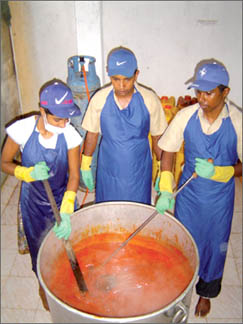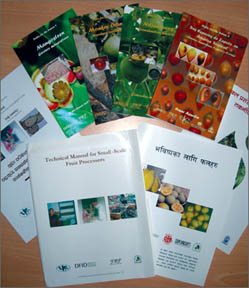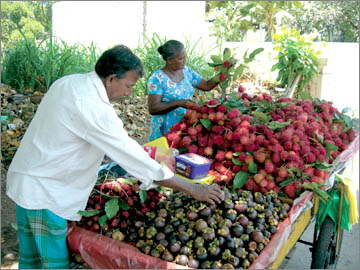Under-utilized crops and fight against hunger and poverty
by Ranga Chandrarathne
|

Fruit processing
|
|

Dr. Hannah Jaenicke
|
As per the definition, the under-utilized crops are the plant species
that are traditionally used for their food, fibre, fodder, oil or
medicinal properties. However, those species have under-exploited
potential to ensure food security, nutrition, health, income generation
and environmental services.
At present, only 150 plants are used and commercialized on a global
scale other than rice, wheat and maize, that provide over 50 per cent of
world's requirement for protein and calories. However, there are an
estimated 7, 000 species that play a crucial role in the livelihood of
poor and potential for commercialization that could fight against
extreme hunger and poverty.
ICUC (International Centre for Under-utilized Crops) originally
founded in 1992 at the University of Southampton in UK which has its
global headquarter in Colombo, has been conducting research in the area
with a view to commercializing under-utilized crops and to understand
their nutritional and medicinal properties so that the commercialization
not only bring about sufficient income for rural poor but also helps to
address extreme hunger and poverty which is one of the Millennium Goals.
According to ICUC Director Dr Hannah Jaenicke, ICUC support national
research organisations in their priorities to develop under-utilized
species, mainly fruit species such as Jak fruit which is an important
species region-wise, tamarind a species though quite well known but
little known in terms of its production, agricultural management and
mangosteen which has a huge export potential in Sri Lanka.
In Sri Lanka ICUC partners national research organisations such as
the University of Peradeniya, HORDI (The Horticultural Research and
Development Institution) and ITI (Industrial Technology Institute).
ICUC has also supported and financed in publication of series of book
titled 'Fruits of Future'. The series includes a monograph on Tamarind
authored by Prof. HPM Gunasena, now Director of CARP (Council for
Agricultural Research Policy).
|

Publications |
Among the under-utilized crops in Sri Lanka, Jack fruit, Beli, Anoda
(Sugar Apple) have been identified for commercialization. ICUC has
trained locals in food processing, especially in under-utilized fruit
such as Jack Fruit, Beli and Anoda (Sugar Apple).
Successful trainees have set up small scale enterprises in diverse
parts of the country, in food processing, especially using
under-utilized crops. Their products ranging from dehydrated Jak Fruit,
Ready-to-serve Fruit drinks, Cordial, Jam, Pickle , Paste, Candy, Fruits
in syrup, Chutney and Fresh Cut fruits, have found their way into local
markets and niche markets such as canteens, hospitals as they have to
compete with established brands.
The entrepreneurs who run Tharindu food processing Industry, a family
business set up in Kandy and Ruweena in Galle are some of the successful
trainees of the ICUC in food processing.
According to a comprehensive survey conducted by ICUC (led by The
Economist Sampath Abeyrathne) which covered the aspects of consumer
behaviour, existing markets and potential international markets and
bottle necks for food products based on under-utilized crops, have
identified that the customers preferred to purchase fruits products from
retail shops and also from supermarkets.
The survey conducted through interviews among 371 persons covering
consumers, producers, retailers, wholesalers and exporters indicated
that though there is a strong brand loyalty among customer, they are
willing to test new products.
Another factor that affects fruit processing small and medium
enterprises (SME) is the seasonality of fruit productions. Although
products such as chutney, concentrated fruit juice, cordial, fruit
drinks were marketed and consumed throughout the year, sales varies on
seasonal basis. For instance, sales peaked, particularly, during the
popular festivals of Tamil and Sinhala New Year, the Vesak and Poson
holidays and Christmas. Sales of drink products peaked during the dry
period.
|

Mangosteen and Rambutan trader |
Wholesale markets such as super markets are bit reluctant to receive
products from under-utilized crops citing that new products will sell
slowly at the initial introductory phase and that consumers were
satisfied with the existing brands. However, the retailers showed
willingness of selling new brands of high quality products from
under-utilized crops.
The raw materials widely used in the fruit processing industry such
as sugar, salt, pectin, sodium metabisculphite (SMS) and citric acid
were bought either from wholesale markets in big cities or in local
markets. However, purchasing raw material has become an issue in remote
areas.
Among the bottle necks are the inherent defects in the existing
supply chain with strong middle men, SME can not deploy company agents
and cost in transportation, unwillingness on the part of whole sale and
supermarket owners to give prominent shelve space for fruits products
from under-utilized crops.
[email protected]
****
ICUC International Centre for Under-utilized Crops ICUC
(International Centre for Under-utilized Crops) whose global headquarter
was recently moved from Southampton University to Colombo.
Through its mandate and experience, is contributing to the research
priorities agreed by the international Agricultural Research Centres.
Among its priorities are:
Promoting conservation and characterization of under-utilized plant
genetic resources to increase the income of the poor.
The conservation, characterization, mapping out and utilization of
genetic resources for the benefit of poor people is at the heart of the
ICUC's mandate. Hundreds of so called Under-utilized species have been
identified, and germplasm collections carried out in a number of partner
countries.
Following the establishment of national genebanks, agronomic and
horticultural studies are carried out, followed by post harvest and
marketing strategies.
ICUC has become a recognized partner in Asia through its
Under-utilized Tropical Fruits for Asia Network (UTFANET) and its Asian
spin-off, the Asian Centre for Under-utilized Crops (ACUC) whose current
members are Bangladesh, Nepal, Sri Lanka, Pakistan, the Philippines and
Vietnam. Need is to increase understanding of the potential species for
industrial use, especially of under-utilized oil and fibre plants, and
to develop links with potential users of these products so that the poor
people will benefit from new developments.
Enhancing Nutritional quality and safety
Through the characterization of priority under-utilized species, and
the selection and propagation of superior germplasm, improved planting
material is made available to the population. Working in tandem with
international food standards agencies, ICUC is also to brand new
products and open up new markets. By promoting crop diversity, ICUC is
contributing to providing natural safety in situations of climate
change.
Increasing income from fruit and vegetables
ICUC has carried out a number of marketing studies on hitherto
under-utilized crops species, notably fruit species in Asia. Training
has been provided to entrepreneurs in processing fruits, and in setting
up and running small enterprises.
Sustainable income generation from forest and trees
A large number of under-utilized crops are either trees, or grow in
forests: fruits and berries, mushroom, rattans, medical herbs, roots and
tubers. However the understanding of how local and cross border markets
for products work is still sketchy, as is the understanding harvesting
methodologies, post harvest and processing methods.
Making international and domestic markets work for the poor
Marketing and enterprise development is one of the priorities for
ICUC's work in the next few years. By developing closer links with the
private sector, organic and ethical companies, ICUC believes great
benefit can be reaped by the poor. Functioning market information system
for a variety of products, and greater understanding on the national and
international rules and standards are for poor to enter these markets.
ICUC work is guided by the UN Millennium Development Goals such as
Eradicating extreme poverty and hunger, Promote gender equality and
empowers women, Reduce child mortality, improve maternal health, Combat
HIV/AIDS, malaria and other diseases, Ensure environment sustainability
and Develop global partnership for development.
*****
Recommendations
The following nine recommendations are offered to support processors
and development officials in their efforts to establish and strengthen
small-scale tropical fruit processing enterprises in Sri Lanka:
1. Identify your market.
Consumers' loyalty to popular brands and wholesalers' reluctance to
promote new brands complicate the entry of new enterprises into major
retail markets. The more successful start-ups adopted a risk-aversion
strategy, catering first to protected niche markets and then gradually
entering major retail markets.
Thus, it is recommended that start-ups survey the market carefully
and make a decision as to whether or not they will initially cater to
protected niche markets before moving into the major retail markets.
2. Encourage the retailers to promote new brands of processed
under utilised fruit products.
The promotion of new brands is inhibited by the fact that marketers
are satisfied with the supply of existing brands. They feel that
offering new brands reduces the space-utilisation efficiency of their
shops, and are therefore reluctant to display new brands in visible
locations on their shelves.
A considerable number of the retailers interviewed in this survey,
however, were willing to try new brands and products; this should be
encouraged by providing good-quality products with longer credit periods
and higher discounts, as well as free samples.
It is also important to accept the return of rejects.
3. Take advantage of consumers' brand consciousness.
Consumers indicated that they were loyal to leading brands of fruit
products, which is a limitation when introducing new brands.
The consumer's brand consciousness can also be taken advantage of,
however, for example by ensuring that a new brand possesses SLS
certification (see recommendation 7) or by operating under an
established brand, for example the well-known REN (Rural Enterprise
Network) brand in the Kandy area.
The development of a common brand amongst groups of enterprises can
increase bargaining power and, at the same time, reduce marketing
overheads for individual enterprises. Quality assurance is, however, of
prime importance when developing a common brand, as is adequate
coordination amongst the processors.
4. Advertise the new brand.
Processors also need to advertise their product, for example by
participating in trade fairs and showcasing the products in target
markets during the introductory phase. Raising retailer and customer
awareness of a new brand/product in the target markets creates increased
demand.
Advertising in the mass media might be attractive, but its high costs
may be prohibitive to small enterprises. Furthermore, small enterprises
may not be able to satisfy the high demand for their products that could
follow such massive advertising. For these reasons, localised targeted
advertising is recommended.
5. Diversify the product palette.
An enterprise has higher efficiency in machine utilisation when more
than one fruit is being processed. This is particularly important for
small start-ups, which might find it difficult to store large volumes of
raw materials for processing during the off-season. By processing a
variety of fruits, the enterprises can significantly increase their
profitability.
The main barrier to higher consumption of chutney, cordial and jam
from under utilised fruits seems to be their lack of availability.
The study indicates that a considerable number of consumers would buy
these products if they were available. Mixed fruit cordial and jam are
widely consumed; it is believed that the introduction of new tastes, by
mixing under utilised fruits with preferred fruits to produce mixed
fruit jam and cordial, would encourage consumers to buy these products.
The taste of these mixed fruit products has to be tested with
consumers, however, before launching them on the market.
6. Develop and maintain strong relationships within the market
chain.
The links between fruit suppliers and processors are not well
established. This is important, as availability of raw materials is one
of the main factors determining the scale of operations of an
enterprise.
The example of jackfruit dehydration enterprises, for instance,
highlights the importance of maintaining a well organised raw material
suppliers' network, and of having good-quality raw materials available
throughout the year.
Therefore, this research recommends that SME develop close
relationships with raw material suppliers, allowing them to obtain good
quality materials at competitive prices.
A comprehensive study should be conducted to analyse the extended
value chain of suppliers of under utilised fruit species raw materials.
Similarly, the link between processors and agents needs to be
maintained and fortified. When targeting the retail market, it is
important that the products be marketed through reputed agents.
Marketing directly to retailers, bypassing the wholesalers, is also an
option for the better established enterprises.
7. Obtain SLS certification for new brands.
Small-scale start-ups reported that the high cost of certification
was a barrier. It is advisable, however, that they design their
factories from the outset with the necessary flexibility to allow them
to adhere to the requirements of the standards office.
Possession of SLS certification facilitates the marketing of new
brands, as retailers are more interested in promoting new products if
they are of certified quality. It is also recommended that small-scale
operators enter into dialogue with the Sri Lanka Standards Institute to
discuss alternative options for the certification of their products and
emerging brands.
8. Improve labour efficiency by using simple equipment in lieu of
labour-intensive operations.
High-paid labour is prohibitive for the profitable operation of some
micro-enterprises. Jackfruit dehydrating enterprises are particularly
labour intensive labour is the second highest cost component of these
enterprises?and thus their profitability is highly sensitive to the cost
of labour. High rates of labour turnover and low labour efficiency are
also reported to reduce the profitability of these enterprises.
Unskilled labour is, however, widely available in Sri Lanka
throughout the year. It is therefore recommended that simple equipment
that can be managed by unskilled labourers be used in lieu of
particularly labour-intensive operations, where appropriate. In
addition, a performance-based payment system can be introduced to
increase labour efficiency.
9. Facilitate access to good-quality packaging materials in remote
areas.
Attractive and appropriate packaging and labelling is particularly
important when introducing a new product into the market. However, the
lack of choices among packaging materials is inhibiting the successful
marketing of new products from under utilised fruits.
In Sri Lanka, production of high-quality packaging materials should
be encouraged as an independent industry, in support of the country's
fruit processing industries. The supply of these materials to remote
areas also needs to be guaranteed. This provides an opportunity for
interventions by BDS providers and development agencies. |
